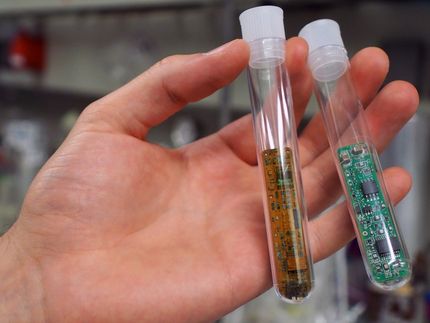Using waste to recover waste uranium
Using bacteria and inositol phosphate, a chemical analogue of a cheap waste material from plants, researchers at Birmingham University have recovered uranium from the polluted waters from uranium mines. The same technology can also be used to clean up nuclear waste. Professor Lynne Macaskie presented the group's work to the Society for General Microbiology's meeting at Heriot-Watt University, Edinburgh.
Bacteria, in this case, E. coli , break down a source of inositol phosphate (also called phytic acid), a phosphate storage material in seeds, to free the phosphate molecules. The phosphate then binds to the uranium forming a uranium phosphate precipitate on the bacterial cells that can be harvested to recover the uranium.
This process was first described in 1995, but then a more expensive additive was used and that, combined with the then low price of uranium, made the process uneconomic. The discovery that inositol phosphate was potentially six times more effective as well as being a cheap waste material means that the process becomes economically viable, especially as the world price of uranium is likely to increase as countries move to expand their nuclear technologies in a bid to produce low-carbon energy.
As an example, if pure inositol phosphate, bought from a commercial supplier is used, the cost of this process is £1.72 per gram of uranium recovered. If a cheaper source of inositol phosphate is used (eg calcium phytate) the cost reduces to £0.09 for each gram of recovered uranium. At 2007 prices, uranium cost £0.211/g; it is currently £0.09/g. These prices make the process economic overall because there is also an environmental protection benefit. Use of low-grade inositol phosphate from agricultural wastes would bring the cost down still further and the economic benefit will also increase as the price of uranium is forecast to rise again.
"The UK has no natural uranium reserves, although a significant amount of uranium is produced in nuclear wastes. There is no global shortage of uranium but from the point of view of energy security the EU needs to be able to recover as much uranium as possible from mine run-offs (which in any case pollute the environment) as well as recycling as much uranium as possible from nuclear wastes," commented Professor Macaskie, "By using a cheap feedstock easily obtained from plant wastes we have shown that an economic, scalable process for uranium recovery is possible".
Most read news
Other news from the department research and development

Get the life science industry in your inbox
By submitting this form you agree that LUMITOS AG will send you the newsletter(s) selected above by email. Your data will not be passed on to third parties. Your data will be stored and processed in accordance with our data protection regulations. LUMITOS may contact you by email for the purpose of advertising or market and opinion surveys. You can revoke your consent at any time without giving reasons to LUMITOS AG, Ernst-Augustin-Str. 2, 12489 Berlin, Germany or by e-mail at revoke@lumitos.com with effect for the future. In addition, each email contains a link to unsubscribe from the corresponding newsletter.























































